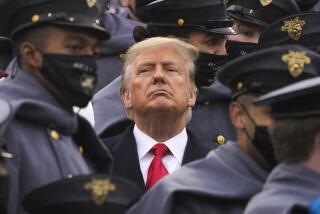Great Divide: Military Elite and Heartland
- Share via
I think we probably bumped Monica Lewinsky from the top of the news,” winced one anonymous White House staffer after the globally televised debacle of the town hall meeting on Iraq at Ohio State University. But the gathering was more than a nightmare of shoddy advance and bad PR. It exposed yet again the abiding divide between the common sense of the American people and strategic assumptions of the national security elite on the fundamental question of war.
For most Americans, whatever their politics, war is a fearful extreme, a measure of last resort. War places sons and daughters in harm’s way. It is justified only when the nation is under such dire threat that there is no alternative. Americans have no desire to police the world. They are uneasy with talk about being the world’s only superpower. One reason that Americans support having the strongest military in the world is in the fond hope that it will not need to be used.
America’s national security elite consider such views simple-minded. They wield America’s global economic and military prowess. With forces arrayed from Seoul to Panama City and fleets that patrol the seas, they see America as the world’s “indispensable nation.”
For the national security elite, military force is part of the broad array of pressures employed in the exercise of power. They talk of providing “incentives” or “sending a message.” They dispatch armadas of ships and planes to back negotiation with the threat of force.
The contrast is illustrated by the story Madeleine Albright’s aides disseminated to tout her credentials to be secretary of state. They described in flattering terms her put-down of Colin Powell over the use of limited airstrikes in Bosnia. Powell, tempered by his experience in Vietnam, opposed the strikes. He considered military force a club, not a scalpel, to be used only in clear missions to smash an enemy with overwhelming force. Albright, contemptuous of Powell’s opposition, reportedly asked the general: “What’s the point in having this superb military you’re always talking about if we can’t use it?”
The divide between the citizenry and the national security elite was on display at Ohio State. Few there doubted that Saddam Hussein is a certifiably foul dictator, but many questioned the terms of the coming war. Why make war on Hussein, asked one, when other dictators have committed similar violations? Hussein, Albright replied, is “qualitatively and quantitatively different.” If so, asked a Marine veteran who lost a son in Vietnam, “are we ready and willing to send the troops in” to finish the job? We don’t want to topple Hussein, replied Defense Secretary William Cohen, we only “want the enforcement of U.N. resolutions.”
Even the sympathetic in the audience grew frustrated at the contradictions and evasions. This is a war against someone Albright calls the most evil man since Hitler, but it doesn’t aim to depose him. It is a war to enforce U.N. resolutions that the U.N. doesn’t support. It will protect neighbors, most of whom are also opposed. It punishes Saddam Hussein for violating his own citizens by raining violence on them. It is to deny Hussein weapons of mass destruction, but the attacks won’t eliminate them and may end any hope of further U.N. inspections.
The only certain promise is that we will “send a message.” And if he ignores it, we will go back and bomb again. Not surprisingly, many Americans don’t find the argument reassuring.
Americans’ common sense about war is more realistic than the sophisticated theories of the national security elite. War--even limited war--is a high-risk venture with often unintended consequences. When the fog of war descends, confusion reigns. Even smart bombs kill innocent people. Skilled pilots in billion-dollar airplanes crash in the night.
Violence is more likely to breed violence than peace. In Iraq, many analysts suggest that limited strikes are more likely to consolidate Hussein’s regime than shake it. Terrorist revenge may be more likely rather than less. Arab nationalism and fundamentalism will spread, not recede.
President Clinton is surely correct when he says that the vast majority of Americans will rally to the troops if he decides to unleash military force. But rather than dismiss the town meeting at Ohio State as simply bad staging, the president and his advisors would be well advised to absorb some of the common sense and profound doubts exhibited by concerned citizens in the nation’s heartland.
More to Read
Sign up for Essential California
The most important California stories and recommendations in your inbox every morning.
You may occasionally receive promotional content from the Los Angeles Times.













